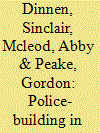| Srl | Item |
| 1 |
ID:
075017


|
|
|
|
|
| Publication |
2006.
|
| Summary/Abstract |
Australia is engaged in a range of police-building exercises with its regional neighbours. The character of this assistance has changed across time and space reflecting, among other things, the development of new approaches to police-building in weak and post-conflict states. This article examines three such approaches adopted in Papua New Guinea and Solomon Islands, respectively. Both countries comprise challenging development contexts marked by high levels of social diversity and topographical fragmentation, weak centralised states, resilient and largely self-regulating village-based societies, and police forces with limited reach, resources, and popular legitimacy. Among other things, the review of Australian police-building experience in the Pacific Islands indicates the need to engage more effectively with non-state actors and organizations in building appropriate and sustainable policing systems in such fragile national environments.
|
|
|
|
|
|
|
|
|
|
|
|
|
|
|
|
| 2 |
ID:
078851


|
|
|
|
|
| Publication |
2007.
|
| Summary/Abstract |
In this paper we begin by defining and examining the concept of police building. Its historical precedents and contemporary forms are briefly reviewed, showing a variety of motives and agendas for this kind of institution building. We argue that police building has been a relatively neglected dimension of nation- and state-building exercises, despite its importance to functions of pacification and restoration of law and order. The emerging literature on international police reform and capacity building tends to adopt a narrow institutionalist and universalistic approach that does not take sufficient account of the politics of police building. This politics is multilayered and varies from the formal to the informal. Using two case studies focusing on events in 2006 in Timor-Leste and Solomon Islands, the reasons for the fragility of many current police-building projects are considered. In both cases, we argue, police capacity builders paid insufficient attention to the political architecture and milieu of public safety.
|
|
|
|
|
|
|
|
|
|
|
|
|
|
|
|